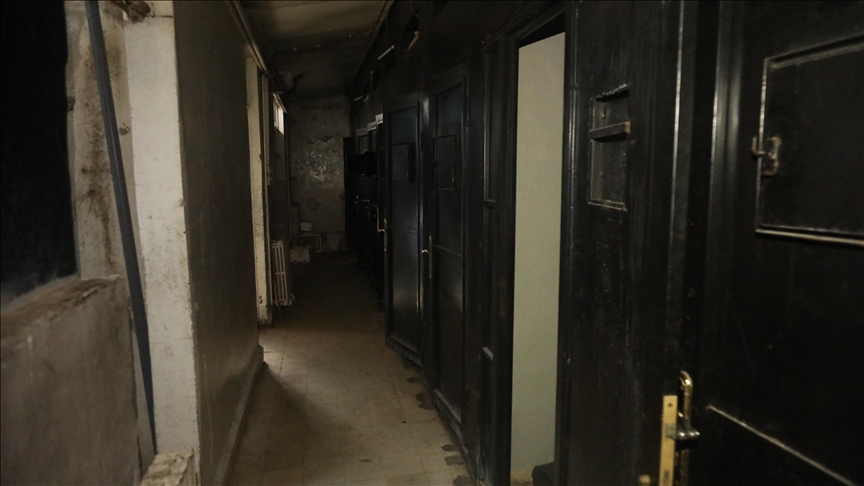Anadolu captures ousted Assad regime's notorious Air Intelligence Branch
'The system punished everyone the same, regardless of age ... regardless of whether they were children or the elderly,' said Syria's Air Intelligence Branch responsible, once prisoner in branch
 Air Force Intelligence Directorate: Syrians' decades-long fear
Air Force Intelligence Directorate: Syrians' decades-long fear
DAMASCUS
The Air Intelligence Branch, one of the most feared torture and interrogation centers of ousted Bashar Assad regime for decades, now stands as a haunting site awaiting documentation as evidence of the crimes committed by the regime.
📹 Footage shows the Air Intelligence Branch of the ousted Bashar Assad regime, notorious for its brutal torture and interrogation practices
📷 The facility, now a grim symbol of the regime's crimes, was notorious for detaining even children and young protesters during the… pic.twitter.com/pGO6rWFtTT
Anadolu Agency reporters have captured chilling footage of the facility, notorious for detaining even children and young protesters during Syria’s civil war. Filthy cells known as the "red cell" and "black room," each the size of a small toilet, reveal the appalling conditions under which detainees were held. Messages carved into the cell walls—such as "Dad, I miss you" and "Mom, I miss you"—attest to the anguish of children longing for their families.
The facility’s wards and solitary cells are strewn with pieces of cardboard, blankets, scattered documents, cutting tools, and various equipment. The dirt-covered walls and cramped spaces, where breathing is a struggle, underscore the inhumane treatment endured by prisoners.-
From detainee to responsible for branch
Majid Uddin Ahmad Al-Houshan, a resident of Damascus' Qaboun neighborhood, was detained by the Assad regime on July 21, 2011, while still a high school student. Now responsible for the branch's security under the new regime, Houshan shared his story of detention and torture in the very facility he now oversees.
Stating that they were students when they participated in the peaceful movements that the people of Syria started in 2011 to demand freedom, he said that the security forces of the regime detained a group of students, including himself.
Houshan stated that after being detained, they were dragged on the street for about a kilometer, beaten, and taken to the Air Force Intelligence Branch in Harasta, where they were kept for two and a half months and then transferred to the Al-Khatib Branch.
Explaining that they were held for eight days in the Al-Khatib Branch before being returned to the Air Force Intelligence Branch, Houshan noted that they were eventually released under an amnesty issued for students at that time.
Regarding the moment of his detention, Houshan stated that he was blindfolded and handcuffed, put in a police vehicle, and taken to the branch. "They told me to walk about two meters. Then I was told that I had to stand at the top of a staircase and someone pushed me. I fell down before my foot touched the step," he said.
Houshan recalled falling on approximately 30 detainees who were already crowded below. He also described how detainees were called to the interrogation room one by one, blindfolded and handcuffed, where their identity information and belongings were taken before being sent to the cells. He added that they were placed in a "red" isolation cell, accused of being caught "red-handed."
Houshan said, "At first, we were 10 people, but within two hours, four more people joined us, including two children aged seven to eight. We spent seven days in the cell with 14 people in a square meter area. During the day, we were only allowed to go to the toilet in the morning. Food was served on plastic plates."
'The real torture was psychological, not physical'
Noting that they were taken for daily interrogations lasting about an hour and beaten without reason by guards while waiting in the corridor, Houshan highlighted that "the real torture is psychological, not physical." He also stated that detainees sometimes had to give names out of fear during these interrogations.
Houshan emphasized that the arrests were arbitrary and said, "It did not matter whether you were involved in the crime or not, their aim was only to increase the number of detainees and tell the officers 'I caught all the demonstrators,'" he said.
Students engrave their longing on cell walls
Houshan recounted being transferred to another area called the "black room" after spending time in the "red cell." He said that underage students like himself had engraved their longing for their parents on the cell walls.
He explained that the walls bore writings such as "dad, I miss you" and "mom, I miss you," and said, "The system punished everyone the same, regardless of age. Everyone was treated the same, regardless of whether they were children or the elderly."
Houshan also noted that he had written his name on the wall, hoping to return one day. After his release, he joined the resistance to "fight against this oppression" and remarked that "many people were finally rescued from these prisons."
Anadolu Agency website contains only a portion of the news stories offered to subscribers in the AA News Broadcasting System (HAS), and in summarized form. Please contact us for subscription options.







